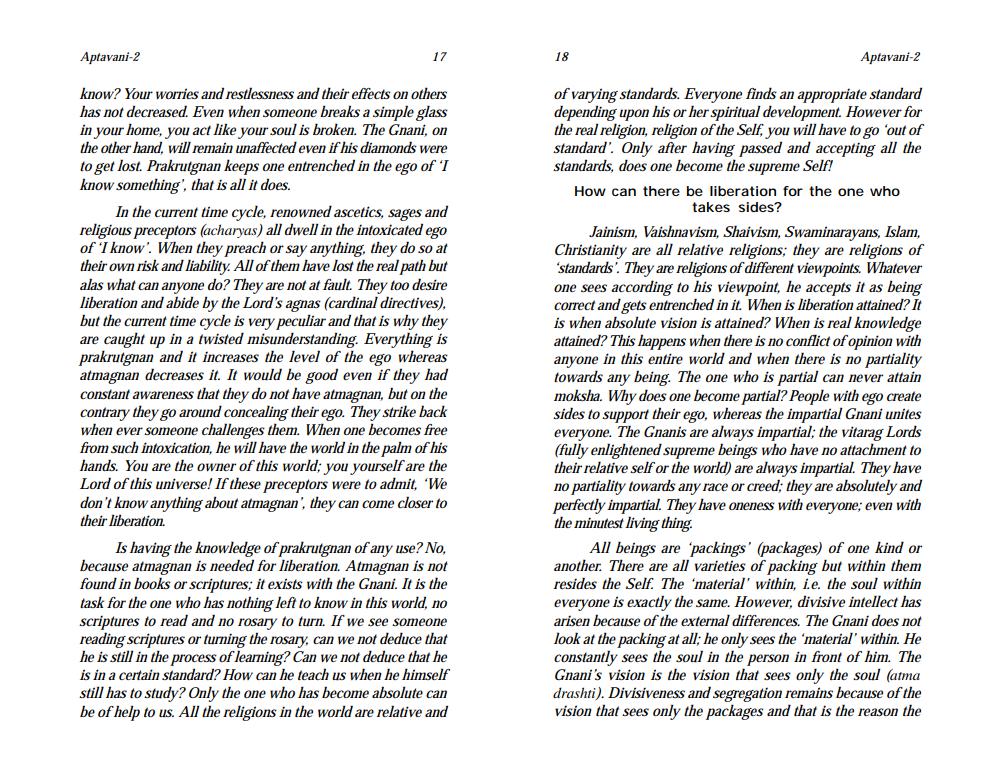________________
Aptavani-2
17
Aptavani-2
know? Your worries and restlessness and their effects on others has not decreased. Even when someone breaks a simple glass in your home, you act like your soul is broken. The Gnani, on the other hand, will remain unaffected even if his diamonds were to get lost. Prakrutgnan keeps one entrenched in the ego of 'I know something that is all it does.
In the current time cycle, renowned ascetics, sages and religious preceptors (acharyas) all dwell in the intoxicated ego of 'I know. When they preach or say anything, they do so at their own risk and liability. All of them have lost the real path but alas what can anyone do? They are not at fault. They too desire liberation and abide by the Lord's agnas (cardinal directives), but the current time cycle is very peculiar and that is why they are caught up in a twisted misunderstanding. Everything is prakrutgnan and it increases the level of the ego whereas atmagnan decreases it. It would be good even if they had constant awareness that they do not have atmagnan, but on the contrary they go around concealing their ego. They strike back when ever someone challenges them. When one becomes free from such intoxication, he will have the world in the palm of his hands. You are the owner of this world; you yourself are the Lord of this universe! If these preceptors were to admit, 'We don't know anything about atmagnan they can come closer to their liberation.
Is having the knowledge of prakrutgnan of any use? No, because atmagnan is needed for liberation. Atmagnan is not found in books or scriptures; it exists with the Gnani. It is the task for the one who has nothing left to know in this world, no scriptures to read and no rosary to turn. If we see someone reading scriptures or turning the rosary, can we not deduce that he is still in the process of learning? Can we not deduce that he is in a certain standard? How can he teach us when he himself still has to study? Only the one who has become absolute can be of help to us. All the religions in the world are relative and
of varying standards. Everyone finds an appropriate standard depending upon his or her spiritual development. However for the real religion, religion of the Self, you will have to go out of standard'. Only after having passed and accepting all the standards, does one become the supreme Self! How can there be liberation for the one who
takes sides? Jainism, Vaishnavism, Shaivism, Swaminarayans, Islam, Christianity are all relative religions, they are religions of 'standards. They are religions of different viewpoints. Whatever one sees according to his viewpoint, he accepts it as being correct and gets entrenched in it. When is liberation attained? It is when absolute vision is attained? When is real knowledge attained? This happens when there is no conflict of opinion with anyone in this entire world and when there is no partiality towards any being. The one who is partial can never attain moksha. Why does one become partial? People with ego create sides to support their ego, whereas the impartial Gnani unites everyone. The Gnanis are always impartial the vitarag Lords (fully enlightened supreme beings who have no attachment to their relative self or the world) are always impartial. They have no partiality towards any race or creed; they are absolutely and perfectly impartial. They have oneness with everyone; even with the minutest living thing
All beings are 'packings' (packages) of one kind or another. There are all varieties of packing but within them resides the Self. The 'material within, i.e. the soul within everyone is exactly the same. However, divisive intellect has arisen because of the external differences. The Gnani does not look at the packing at all; he only sees the 'material' within. He constantly sees the soul in the person in front of him. The Gnani's vision is the vision that sees only the soul (atma drashti). Divisiveness and segregation remains because of the vision that sees only the packages and that is the reason the




